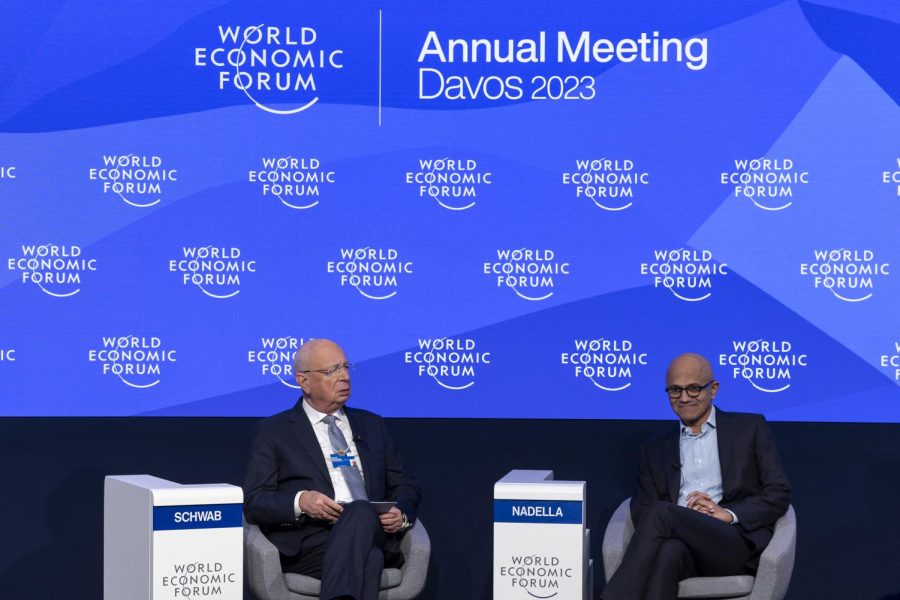American business leaders discuss future at World Economic Forum meeting
February 6, 2023
The World Economic Forum welcomed conversations about the state of the economy and the world at its 53rd annual meeting in Davos, Switzerland.
The theme of the five-day event, which took place from Jan. 16 to Jan. 20, was “cooperation in a fragmented world.” Government figures and business leaders across the globe gathered together to talk about pressing world issues such as the pandemic, supply chain problems and the war between Russia and Ukraine — all of which affect the global economy.
Attendees expressed their worries about the United States entering a recession. They also discussed the direction that businesses are taking regarding environmental protection, questioning if there should be more subsidies for energy innovation and if businesses can rapidly reduce their carbon footprint.
The idea of inclusivity and transition bounced from each panel.
In a panel titled “Financial institutions: Innovating under pressure,” PayPal Holdings Inc. CEO Dan Schulman emphasized the importance of making innovative financial decisions, with the help of technology, to serve more people.
“In a country like the U.S., you have two out of every three adults struggling to make ends meet at the end of the month,” Schulman said. “We have a good financial system — one that has integrity behind it — but I don’t think it’s doing the job it needs to do, which is being an inclusive economy that brings everybody together.”
In that same panel, New York Stock Exchange President Lynn Martin added to the conversation of financial innovation. She described banks as technology companies.
“Every company is really a technology company is something I like to say because every company is using technology to further their business,” Martin said, adding that the “convergence between the traditional financial institutions and the technology companies” is a great thing because it makes things more efficient.
To stay relevant and at speed, most companies will continue to expand their technology to further grow their business with efficiency in mind.
The tone of the panel was hopeful about the long-term scope of technology, especially with the conversations arising around artificial intelligence, which was mentioned but not discussed. Additionally, they briefly touch on the idea of cautiousness and inclusivity in mind not only for American citizens but the global economy.
Global emissions were discussed but not put at the forefront of the conversation. At the Davos meeting, the health of our world was an important topic of conversation and discussion.
Vicki Hollub, who is the president and CEO of Occidental Petroleum, attended the “Mastering New Energy Economics” panel.
“What is important to understand is our emissions,” Hollub said, adding that “it’s not the energy source, and what we need is a more thoughtful transition” so that the United States doesn’t “leave developing countries behind.”
The Inflation Reduction Act, which was enacted in the United States in 2022, was discussed during the panel in regard to its agenda to support clean energy and sustainable practices and farming.
The panel discussed subsidies to help jump-start the process to transition to clean energy, but Hollub said that although it can certainly help, the question at hand is “how will it be limited?”
Although she said that “subsidies are very important for the development of new technologies,” she also noted that businesses might not be able to develop a solid business model if they rely on them for too long.
She said that the subsidies are needed but should be limited, thus there is a need for a robust policy with acceleration and risk.
Similarly, to the panel about financial institutions, inclusivity was at the heart of the conversation, strengthening the sense of a globalized economy.
Martin Wolf, who is the chief economics commentator at the Financial Times, challenged the cooperation of the leaders of the world to come together to put forth an effort to make these significantly needed changes.
“If you want this to be a global activity, emerging and developing countries are where all the growth and energy consumption and emissions are going to come from,” Wolf said in the panel.
Ideas and morals will not be the only vehicles needed for change. Ultimately, there will need to be a large investment in capital to initiate the process, which will inevitably become political.
“What is politically feasible may not match what is globally essential,” Wolf said.







